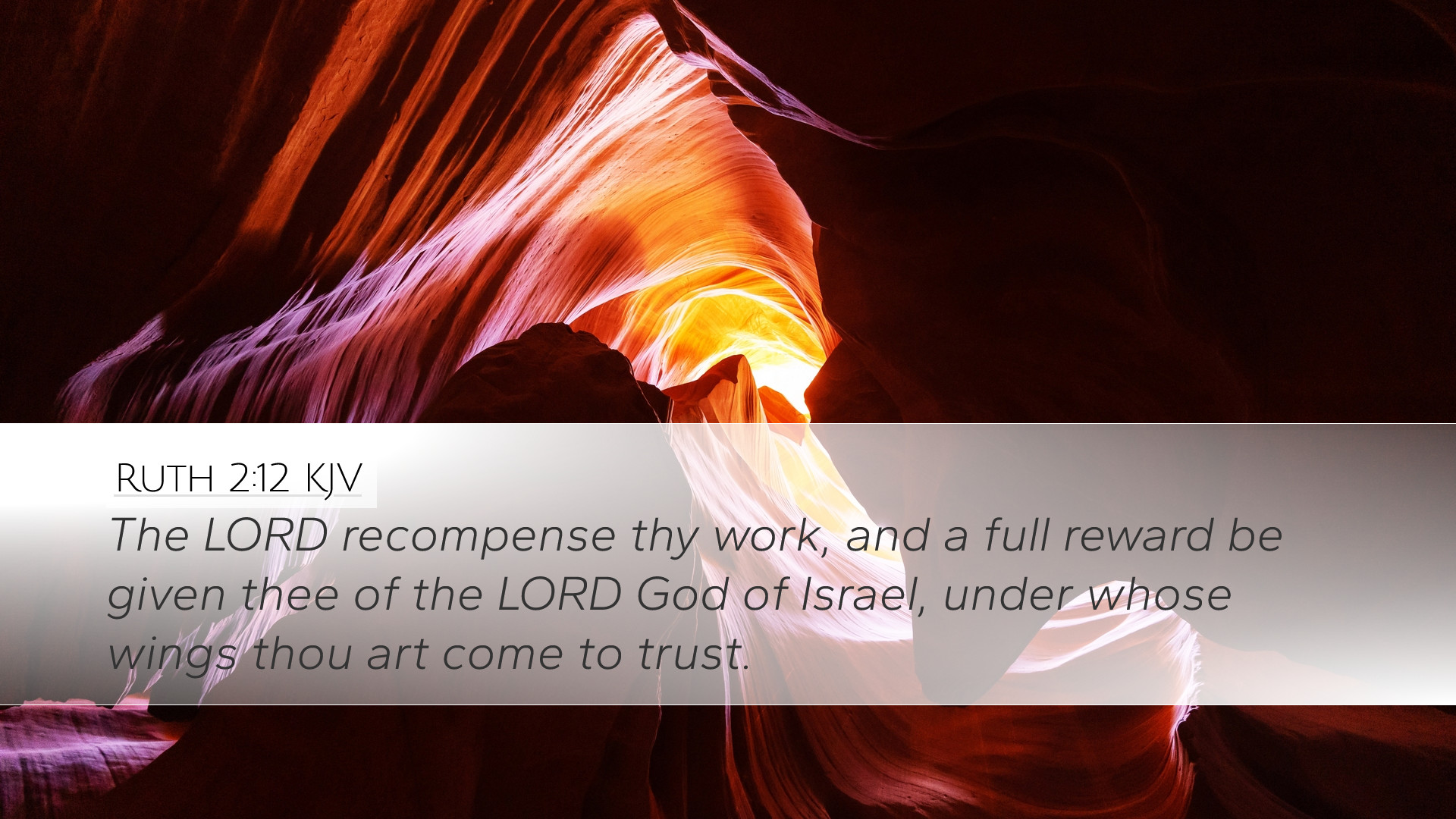Old Testament
Genesis Exodus Leviticus Numbers Deuteronomy Joshua Judges Ruth 1 Samuel 2 Samuel 1 Kings 2 Kings 1 Chronicles 2 Chronicles Ezra Nehemiah Esther Job Psalms Proverbs Ecclesiastes Song of Solomon Isaiah Jeremiah Lamentations Ezekiel Daniel Hosea Joel Amos Obadiah Jonah Micah Nahum Habakkuk Zephaniah Haggai Zechariah MalachiRuth 2:12
Ruth 2:12 KJV
The LORD recompense thy work, and a full reward be given thee of the LORD God of Israel, under whose wings thou art come to trust.
Ruth 2:12 Bible Commentary
Bible Commentary on Ruth 2:12
Verse: "The LORD recompense thy work, and a full reward be given thee of the LORD God of Israel, under whose wings thou art come to trust."
Introduction
The profound societal and theological themes of the Book of Ruth come to a reflective apex in 2:12. In this verse, we find a beautiful intertwining of divine providence, human faithfulness, and the concept of reward. The declarations made in this verse resonate deeply with the experiences of believers, providing insights relevant to pastors, students, theologians, and scholars alike.
Contextual Background
Ruth, a Moabite widow, shines as a model of loyalty and faith. Having chosen to follow her mother-in-law Naomi back to Bethlehem, Ruth steps into the unknown, both culturally and economically. Chapter 2 presents Ruth gleaning in the fields of Boaz, a relative of Naomi, which is not just an act of physical sustenance but also of obedience to the Jewish customs surrounding gleaning.
Commentary Insights
1. The Nature of Divine Reward
Matthew Henry emphasizes that the Lord’s recompense is an essential theme in Scripture, indicating that our earthly works do not go unnoticed by God. Ruth’s dedication to Naomi and her actions in the fields of Boaz are recognized not only by men but also by the Lord. Henry notes, "A full reward" signifies that God not only recompenses but does so abundantly, reflecting His boundless grace and generosity.
2. The Role of Trust
Albert Barnes explores the significance of trust in contextualizing this verse. He posits that "under whose wings thou art come to trust" expresses Ruth's complete reliance on God. This phrase conveys a nurturing protection like that of a mother hen for her chicks. While Ruth may be physically gleaning in the fields, she has spiritually aligned herself with Yahweh, receiving protection and provision through her faith.
3. Theological Implications
Adam Clarke delves into the theological richness of God’s protective nature and the rewards for faithfulness. The fulfilment of His promises is as certain as His character. Clarke elaborates that Ruth, by coming into the land of Israel and embracing the God of Israel, illustrates the covenantal relationship established by faith. Thus, every act of kindness, loyalty, and faith becomes a seed for divine recompense.
Applications for Contemporary Believers
The principles drawn from Ruth 2:12 provide vital lessons for modern Christians. Here are a few key reflections:
- Faithfulness in Service: Ruth’s diligent gleaning reflects an attitude of service that challenges believers to embody commitment to their community and God’s work.
- Divine Providence: Just as Ruth trusted in God’s provision, believers are called to rely on God’s care in their lives. The metaphor of being under God’s wings can be a source of comfort during trials.
- Reward and Encouragement: The reminder that God rewards faithful service encourages believers to persevere in their duties, knowing that their efforts align with God’s greater purposes.
Conclusion
In Ruth 2:12, we encounter a rich tapestry of hope, fidelity, and divinely assured recompense. This verse serves as an exhortation and encouragement to all followers of Christ, inspiring them to trust in God’s sovereignty and respond to His faithfulness with unwavering commitment. As pastors and leaders reflect on this rich biblical text, may they draw upon its depth to encourage their congregations toward faithful living.


